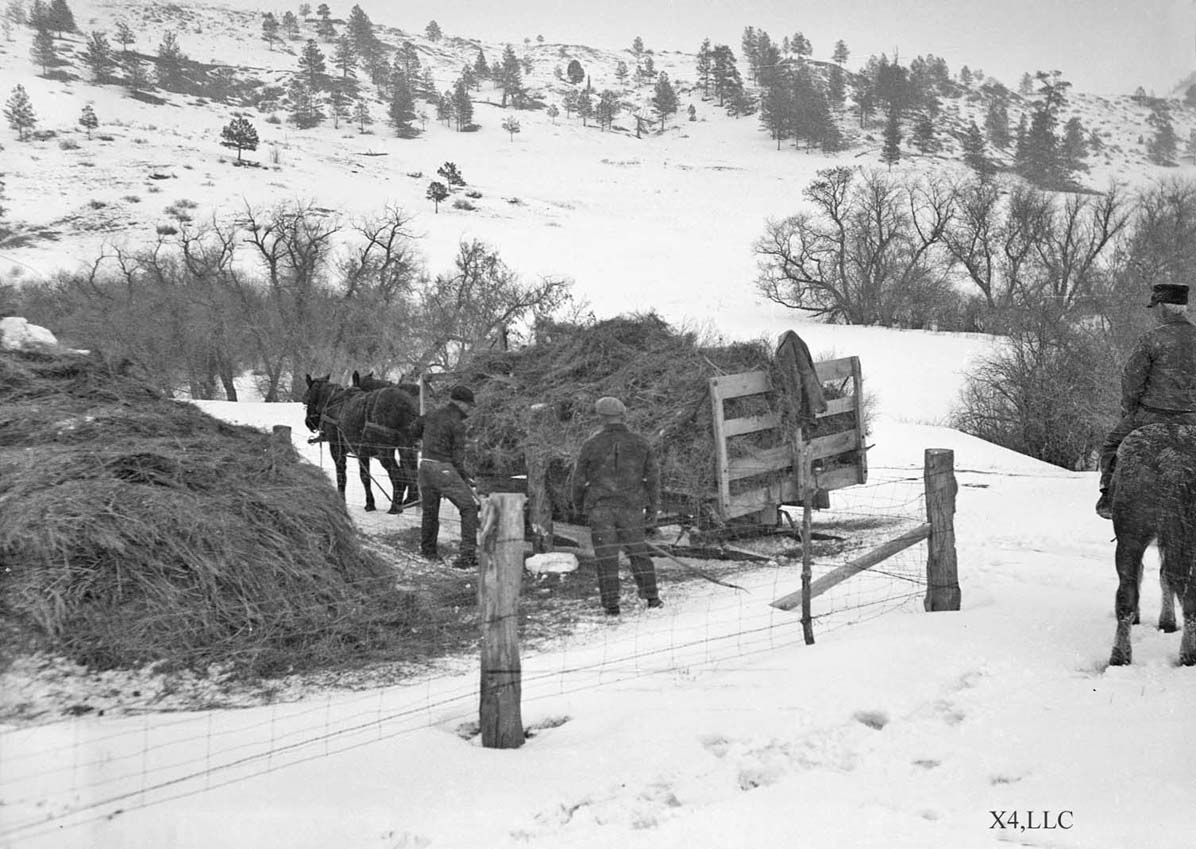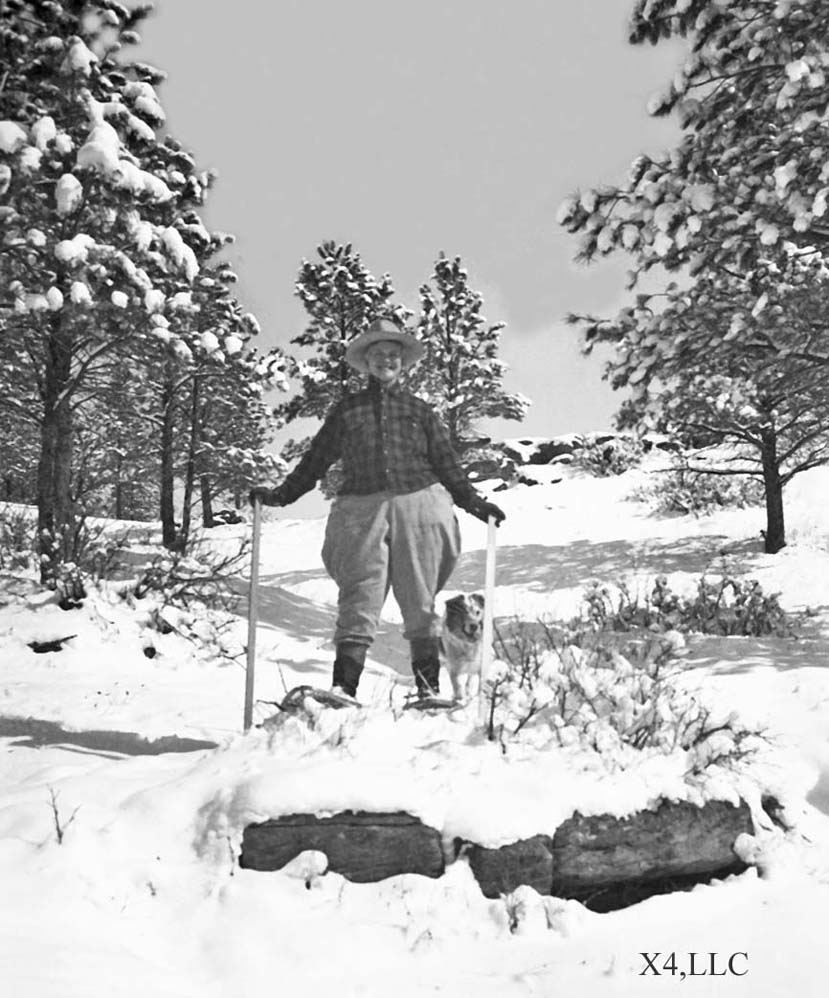Wishing for a Chinook Wind
Feb 01, 2024 by Tempe Javitz
The cold snap that hit the Rocky Mountain area in
January was not unprecedented for that time of year.
However, this time the subzero temperatures plus the
windchill broke longtime records. I remember as a
child that it often was 20 below zero at our family’s
ranch in SE Montana in January. The temperature would
climb to maybe 20 above during the day. We wore enough
clothes and balaclava wool masks that the only thing
uncovered was our eyes. Our breath would freeze on the
outside of our wool masks. We delighted in being scary
looking.
At night we would dream of the Chinook winds, hoping they
would come soon. Often those warm dry winds did arrive
in February, blowing off the eastern slopes of the Rocky
Mountains. Then the daytime temperatures would rise to 35
or 40 degrees, and we would run outside to play, stripping
down to our T-shirts. The snow then would subside and melt
making great texture for snow ball fights.
Despite the cold, a driving wind, or below freezing
temperatures my grandparents Jessamine and Will Johnson
were busy each winter day taking care of their cattle and
horses at the X4 Ranch and then the Rosebud Mountain Ranch.
Putting up hay each summer paid great dividends in keeping
their stock healthy and thriving.

Daily feeding the cattle and horses via the hay wagon.
Similar winds to Chinooks occur in other parts of the world
and are known generally as foehn winds. The name Chinook
Wind is adopted from the Chinook Tribe of the Northwest Coast
of Washington and Oregon. The Columbia River was their major
thoroughfare, a rich source of salmon. Today the salmon from
that area are still referred to as Chinook salmon. The tribe
traded dried salmon with many other indigenous peoples of the
west coast. The Chinook tribe was first described in detail by
Lewis and Clark in 1805. From these records, plus other traders
and explorers, we know something about traditional Chinook life
before they were forcibly moved to reservations.
A few more wintery and fun photos from Jessamine’s collection.

Jessamine on her snowshoes in mid-winter

Alcibiades & Puss in Boots sunning themselves.
I hope you have read my book “Bighorn Visions, the Photography
of Jessamine Spear Johnson.” If not, here is the link to the
South Dakota Historical Society Press. They would love to hear
from you. https://www.sdhspress.com/books/bighorn-visions
Resources: A great website for my information on Chinook
winds is https://www.accuweather.com/en/weather-news/what-are-chinook-winds/339761
Or: https://www.livescience.com/58884-chinook-winds.html
January was not unprecedented for that time of year.
However, this time the subzero temperatures plus the
windchill broke longtime records. I remember as a
child that it often was 20 below zero at our family’s
ranch in SE Montana in January. The temperature would
climb to maybe 20 above during the day. We wore enough
clothes and balaclava wool masks that the only thing
uncovered was our eyes. Our breath would freeze on the
outside of our wool masks. We delighted in being scary
looking.
At night we would dream of the Chinook winds, hoping they
would come soon. Often those warm dry winds did arrive
in February, blowing off the eastern slopes of the Rocky
Mountains. Then the daytime temperatures would rise to 35
or 40 degrees, and we would run outside to play, stripping
down to our T-shirts. The snow then would subside and melt
making great texture for snow ball fights.
Despite the cold, a driving wind, or below freezing
temperatures my grandparents Jessamine and Will Johnson
were busy each winter day taking care of their cattle and
horses at the X4 Ranch and then the Rosebud Mountain Ranch.
Putting up hay each summer paid great dividends in keeping
their stock healthy and thriving.

Daily feeding the cattle and horses via the hay wagon.
Similar winds to Chinooks occur in other parts of the world
and are known generally as foehn winds. The name Chinook
Wind is adopted from the Chinook Tribe of the Northwest Coast
of Washington and Oregon. The Columbia River was their major
thoroughfare, a rich source of salmon. Today the salmon from
that area are still referred to as Chinook salmon. The tribe
traded dried salmon with many other indigenous peoples of the
west coast. The Chinook tribe was first described in detail by
Lewis and Clark in 1805. From these records, plus other traders
and explorers, we know something about traditional Chinook life
before they were forcibly moved to reservations.
A few more wintery and fun photos from Jessamine’s collection.

Jessamine on her snowshoes in mid-winter

Alcibiades & Puss in Boots sunning themselves.
I hope you have read my book “Bighorn Visions, the Photography
of Jessamine Spear Johnson.” If not, here is the link to the
South Dakota Historical Society Press. They would love to hear
from you. https://www.sdhspress.com/books/bighorn-visions
Resources: A great website for my information on Chinook
winds is https://www.accuweather.com/en/weather-news/what-are-chinook-winds/339761
Or: https://www.livescience.com/58884-chinook-winds.html
